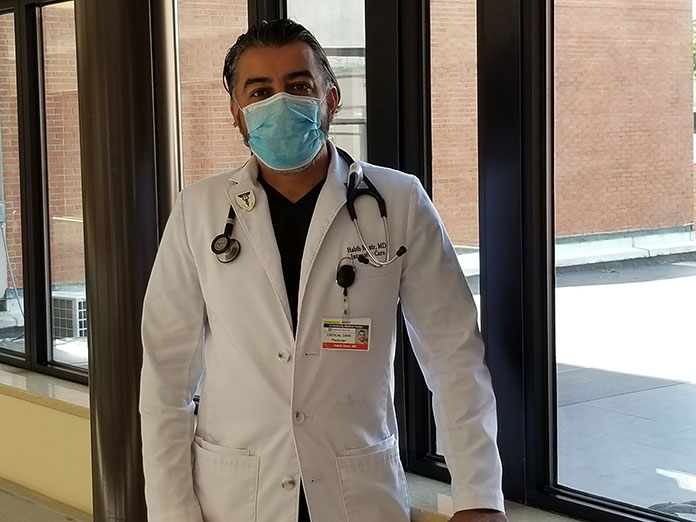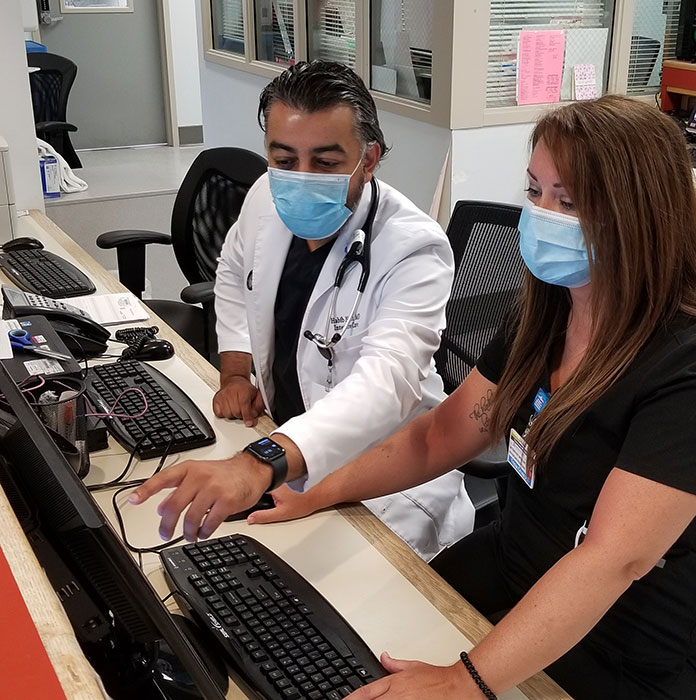
NEW JERSEY – Those in the medical field are on the front line of the COVID-19 pandemic. Since the health crisis began, they have seen many modifications to their daily routine and how they are treating patients.
Dr. Habib Nazir of Marlboro is a critical care intensivist at Community Medical Center in Toms River. He is one of many in the medical profession who are doing what they can to meet the ever-changing challenge of providing treatment during a pandemic.
He shared with Jersey Shore Online what it has been like adapting to the ongoing pandemic conditions that health workers have been quick to respond to.
“I’m a critical care doctor and my group and I work in the intensive care unit,” Nazir said. “How we describe our role is a term we call life support specialists. On a day-to-day basis we take care of patients that are critically ill in the intensive care unit for a variety of things.”
He said such patients may have suffered heart attacks, strokes or things like septic shock or similar severe infections. “We manage that on a day-to-day basis but once the pandemic actually started we saw very quickly that our patients were all transitioned and they only had the coronavirus.
“That isn’t to say we weren’t managing other cases as well. We were no longer taking care of patients who had strokes or heart attacks. They weren’t coming to the hospital as much. They were staying at home,” Dr. Nazir said.
“We saw our role expand nearly five times in the amount of patients that we were taking care of. We had to expand and hire other physicians to come and help us to take care of them,” the doctor said. He added that he felt there were patients who should have come in for treatment but did not do so out of fear of contracting the virus.
He added, “whether they were too afraid or just avoiding any type of health care facility there were definitely patients that should have come in to the hospital to seek treatment that did not.”
Dr. Nazir said he and his group operate through shift work “so we do a 100 to 160 hours a month…We have doubled our work load so while most people got to stay at home for their safety and also got to enjoy that family time and be present with and for each other – we unfortunately got less time at home.”
When asked how he and his family which includes his wife and children are coping with the pandemic he responded that “everyone in the general public is the front lines. Our families are the front lines. It is our job to try to heed the warnings and pay attention to the science and prevent the disease from spreading. It is our job to do that as people.”
Dr. Nazir said that “if we stay in and follow the principles that are told to us, we can stop this disease from spreading and so I would describe our job as we are the last defense actually. From what I have heard from my partners and all the different nurses we work with it definitely took an emotional toll on us.”

He said those in the profession have different ways of coping with the stress of the pandemic. For him it was his family. “They helped me more than anything else. My parents, my spouse my children and it was like ‘okay, he works in a hospital it his job and his duty and it will be our duty to support him so he can do that job.’”
“Initially it was long hours at work and it was me hiding in the basement because I have two young children. At some point it became a decision where it was the family – not just me going to work and then handling this alone,” Dr. Nazir said.
He expressed concern that some members of the public “think we are doing better than we really are as far as containing the spread of this disease. I’m afraid that people are suffering from quarantine fatigue. It is easier to stay quarantined in the middle of February and March in New Jersey.” However, with the warmer weather people want to go out. Also, they might have lost their job from the quarantine and are going through difficult times.
“There is so much information and it is very hard for people to determine what is accurate information and what is just noise. I am afraid there is a complacency and a quarantine fatigue going on and I am afraid this will contribute to this ongoing pandemic and ongoing spread and will prolong this period,” he said.






